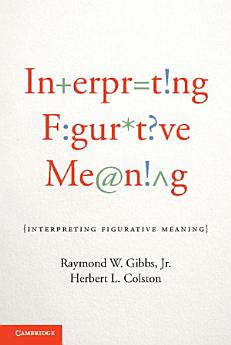Interpreting Figurative Meaning
avr. 2012 · Cambridge University Press
E-book
391
Pages
reportLes notes et avis ne sont pas vérifiés. En savoir plus
À propos de cet e-book
Interpreting Figurative Meaning critically evaluates the recent empirical work from psycholinguistics and neuroscience examining the successes and difficulties associated with interpreting figurative language. There is now a huge, often contradictory literature on how people understand figures of speech. Gibbs and Colston argue that there may not be a single theory or model that adequately explains both the processes and products of figurative meaning experience. Experimental research may ultimately be unable to simply adjudicate between current models in psychology, linguistics and philosophy of how figurative meaning is interpreted. Alternatively, the authors advance a broad theoretical framework, motivated by ideas from 'dynamical systems theory', that describes the multiple, interacting influences which shape people's experiences of figurative meaning in discourse. This book details past research and theory, offers a critical assessment of this work and sets the stage for a new vision of figurative experience in human life.
À propos de l'auteur
Raymond W. Gibbs, Jr is Professor of Psychology at the University of California, Santa Cruz. He is the author of several books including The Poetics of Mind: Figurative Thought, Language, and Understanding and Embodiment and Cognitive Science. He is also editor of the volume The Cambridge Handbook of Metaphor and Thought and editor of the journal Metaphor and Symbol.
Herbert L. Colston is Professor of Psychology at the University of Wisconsin, Parkside. Dr Colston has published widely and edited several books including Figurative Language Comprehension: Social and Cultural Influences and Irony in Language and Thought: A Cognitive Science Reader.
Donner une note à cet e-book
Dites-nous ce que vous en pensez.
Informations sur la lecture
Smartphones et tablettes
Installez l'application Google Play Livres pour Android et iPad ou iPhone. Elle se synchronise automatiquement avec votre compte et vous permet de lire des livres en ligne ou hors connexion, où que vous soyez.
Ordinateurs portables et de bureau
Vous pouvez écouter les livres audio achetés sur Google Play à l'aide du navigateur Web de votre ordinateur.
Liseuses et autres appareils
Pour lire sur des appareils e-Ink, comme les liseuses Kobo, vous devez télécharger un fichier et le transférer sur l'appareil en question. Suivez les instructions détaillées du Centre d'aide pour transférer les fichiers sur les liseuses compatibles.





